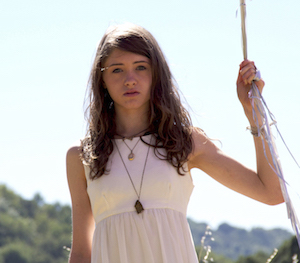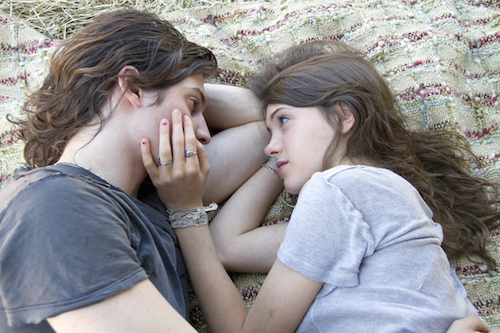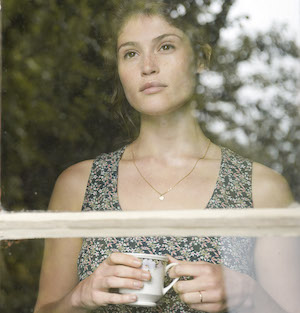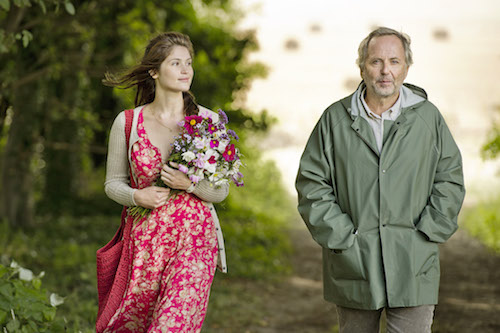Female Desire on Film: Quirky American and Comedic French
This week: two very different movies from female directors, who are (sadly) still an extreme minority, even in independent film. I Believe in Unicorns and Gemma Bovery both open on Friday, May 29th.

Courtesy of Gravitas Ventures
Leah Meyerhoff’s first feature, which she both wrote and directed, is the semi-autobiographical I Believe in Unicorns, a simple yet visually inventive film about a sensitive teen’s first love (and sex) affair. Davina (played by the wonderfully soulful Natalia Dyer) lives with and cares for her disabled mom (played by Meyerhoff’s actual mother, Toni), whose husband abandoned her many years before. We all know — or were — girls like Davina: creative, whimsical, deep-thinking types who live largely in their imaginations. Davina collects unicorn toys, dresses inventively and takes searching self-portraits with a Polaroid camera. One day she spots Sterling (Peter Vack) skateboarding with his pals and becomes smitten with the sexy, slightly older teen, who is clearly a Bad Boy. (Though the moody, kinetic Sterling might seem a bit goofy to us, he is devastating bait to a 16-year-old.)
He becomes equally charmed by her and they soon become a couple, but not without some glitches; after their first sexual encounter backstage at a punk club, he becomes distant much to her distress, but she pursues him almost aggressively. It’s unusual and somewhat refreshing to see a teenage girl’s desires portrayed so matter of factly and Dyer is great at showing how the inexperienced Davina is overwhelmed, even frightened, even as she’s completely caught up in their physical relationship.
Young love blooms amid self-consciously jokey banter, story-telling and play-fighting; Sterling is like an intelligent, overgrown child, albeit one haunted by emotional demons. Davina needs clarification of his feelings and their relationship, and he gives her the right answers at first. The two decide to escape, she from the drudgery of her home life, he from boredom; they take off in his car and have the kind of giddy road adventure (which includes mild shoplifting and stealing keys to a motel room) that only the very young can pull off.

Courtesy of Gravitas Ventures
Meyerhoff alternates their story with vivid fantasy sequences representing Davina’s imagination, using slow motion, time-lapse photography, unusual lighting and other effects. A parallel animated narrative stars a stuffed unicorn that becomes imperiled as the couple’s relationship shifts into something darker. The movie’s tone – not light to begin with – becomes ominous as the sex turns violent and Sterling more volatile. We fear for Davina, but she is a strong character who values herself and her own needs.
With its two solid leads, believable emotions and dialogue, and fantasy elements that aptly define her heroine, Meyerhoff has created a compelling, unusual portrait of teen love and self-discovery.

Courtesy of Music Box Films
Anne Fontaine’s Gemma Bovery (based on the graphic novel by Posy Simmonds), which she co-wrote with Pascal Bonitzer, is a droll, engaging comedy with a slightly dark streak. It’s both funny – thanks mainly to the deadpan Fabrice Luchini — and sensual, buoyed by beautifully shot scenes of Normandy. The film which is both a sort of homage to Flaubert’s Madame Bovary and a mild rejection of the classic male fantasy of the tragically unfulfilled woman, is delivered with a light touch by Fontaine, who finds a nice balance amid its various elements.
The film is told in flashback, narrated by Martin (Luchini), a Flaubert-obsessed Parisian who lives with his wife and teenaged son in Normandy, where he has become an artisanal bread baker. When a British couple, Gemma and Charlie Bovery, move in next door, he is delighted and amazed by the similarity in name to the couple in his favorite novel. Martin becomes friendly with them and soon becomes smitten with the luscious Gemma (sensitively played by the perfectly cast Gemma Arterton), who seems somewhat bored and distracted. Indeed, she is not particularly thrilled with the leaky, mouse-infested house nor with her cheerfully decent husband (Jason Flemyng). Martin offers to teach her how to make bread, which leads to one of the movie’s sexiest scenes, as her slow kneading drives Martin out of his mind with desire, though he doesn’t act on his feelings.
Soon he’s tracking her every move, frantically and hilariously drawing parallels between real life and Flaubert’s novel, becomingly almost hysterical (Madame Bovary spoiler alert!) over her use of rat poison for the mouse problem. When aristocratic young Hervé de Bressigny (Niels Schneider) shows up and is instantly attracted to Gemma and vice versa, Martin thinks he knows exactly what is happening. He becomes increasingly more involved, confronting Gemma at one point in an attempt to warn her about her choices. She assures him that she is, unlike Emma Bovary, completely in control of her life. And unlike Martin’s romanticized ideal, Gemma is a very real person, struggling with French verb conjugations and working out to lose weight, at the nudging of a neighbor (the very funny Elsa Zylberstein, playing a sort of French version of an Orange County Housewife).

Courtesy of Music Box Films
Though Gemma is portrayed as gorgeously seductive, it seems authentic rather than forced, thanks to both Fontaine and Arterton, who — to be honest — would ignite fantasies in most breathing human beings. Martin comes off as funny rather than creepy, given his hangdog expression, near-hysteria and courtly manners. The movie’s resolution is both somewhat expected and quite clever, involving a huge misunderstanding among the various men in Gemma’s life.
Viewers who have read Flaubert will anticipate and appreciate the film’s parallels, but it’s not necessary to enjoy this amusing take on the often tired genre of classic novel adaptations.
—Marina Zogbi

